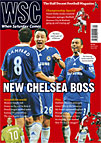 Chelsea sack Scolari after only eight months in charge
Chelsea sack Scolari after only eight months in charge
The sacking of Phil Scolari shocked the press, who reacted with widespread criticism of Chelsea’s actions. The 30th managerial casualty of the season had only been given 36 games and he was an internationally famous name with a 56 per cent win rate. Within a few days however the mood had changed. The club’s hierarchy was still attacked in opinion columns but there was also plenty of space given over to justification for Scolari’s departure. Indeed the papers were suddenly filled to bursting with leaked information bulked out by psychological conjecture and conspiracy theory.
Among reported complaints from the boardroom about Scolari’s manner there were vivid reports of how the manager “lost the dressing room” with John Terry and Frank Lampard said to have passed on players’ grievances directly to Roman Abramovich. According to the Daily Express, Scolari had twice previously been talked out of walking away while the Sun salivated over a “tangled web of accusation, lies and espionage”. Big Fail Scolari was the pun of choice.
We heard that the “shadow of Mourinho” still loomed large and there were criticisms of Chelsea’s defending at set-pieces, the lack of a “plan B”, and, a staunch favourite, Scolari’s lack of experience in European club football. Of course Scolari can be criticised and there were clearly internal problems at Chelsea but ultimately he was the victim of an absurd new boardroom machismo. By sacking a manager while the team are still in Europe and firmly planted in the top four, Chelsea’s owners were seeking to suggest that they have uniquely high standards; very few other clubs could (or would) sack a manager of Scolari’s stature after such a short time. Indeed, very few other clubs expect success every season or feel that they need it to capture as much of the international TV market as possible.
A radio reporter standing outside Stamford Bridge commented that fans “wanted to see the Chelsea of old”. Presumably this golden-era, “old” Chelsea is the one of three years ago rather than 30 years ago. Ironically, despite the fundamental changes at the club since Abramovich’s arrival, reminders of the club’s past were never far away. The tension between “old” and “old-old” Chelsea was painfully clear in Tony Cascarino’s column in the Times. The former Chelsea “legend” (eight goals in 40 games) stated: “It doesn’t matter if you’re a manager who’s lifted the World Cup and you’re only seven months into your job. It wouldn’t surprise me if Chelsea’s stars had begun to lose faith in Luiz Felipe Scolari because top players are like Roman Abramovich, the club’s owner: they demand the best.” Meanwhile Seventies stalwart Chopper Harris believed that Scolari had alienated supporters by an “if they give me the sack, they can pay me up” attitude. The message was clear: Chelsea are the very pinnacle of the footballing world.
In the week that Scolari was dismissed Chelsea announced a deficit of £66 million for their last financial year. It’s the latest in a series of huge losses made by the organisation whose chief executive Peter Kenyon has to pretend it is being run like other football clubs. “There is no doubt that the positive upward trends of turnover and the continued reduction in losses shows that Chelsea is building a strong business base,” he said, almost as though he believed it. Among the most wasteful items of Chelsea’s expenditure is the salary of their chief executive who doesn’t seem to be party to major decisions such as sacking the manager, which took place while Kenyon was on holiday. Ed Upright
From WSC 266 April 2009